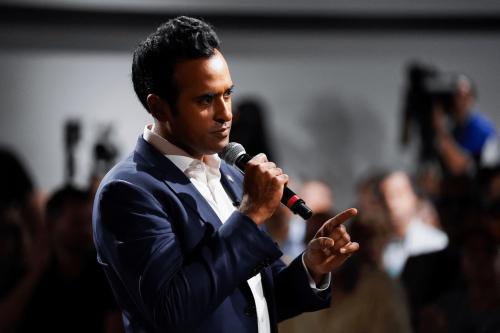In 2024, Americans in eight key states had the opportunity to vote in both a competitive U.S. Senate race and in the presidential contest between President-elect Donald Trump and Vice President Kamala Harris. While he carried each of those states, many of Trump’s supporters either cast what some call “bullet ballots,” voting only for Trump and no down-ballot candidates, or they split their tickets by voting for the Democratic Senate candidate as well as Trump.
This pattern may have cost the Republicans four additional Senate seats in the upcoming 120th Congress. It helped the Democrats save incumbent senators in Wisconsin and Nevada and elect Democrats to open seats in Michigan and Arizona. Although such voting behavior was not enough to save Democratic incumbents in Ohio and Pennsylvania and defeat a Republican incumbent in Texas, it made the Senate contests in those states far more competitive as well, according to NBC election results and exit polls in each of the states.1
Let’s have a look state-by-state, starting with the states where Democratic Senate candidates won.
Wisconsin U.S. Sen. Tammy Baldwin was the only Democratic incumbent running for reelection in a battleground state that got more votes than Vice President Harris did in their state. Baldwin’s vote total of 1,672,777 was 4,548 more than Harris received. Meanwhile, in the same election, her Republican opponent Eric Hovde received 96.8% of Trump’s vote total—53,630 fewer votes than Trump. In addition, Baldwin had a 34,031-vote advantage among those who cast a split ticket ballot. Since Sen. Baldwin only won by 28,781 votes (or 0.9 points), those Trump voters who made it to the polls but didn’t vote in the senatorial contest or who voted for Baldwin rather than Hovde cost the GOP an eminently winnable seat in the incoming U.S. Senate.
In Nevada, incumbent Democratic Sen. Jacky Rosen came close to also exceeding Harris’ vote in her state. Her vote total of 701,105 was 99.4% of Harris’ total vote of 705,197. Her Republican challenger, Sam Brown, only received 677,046 votes, a falloff of almost 10% (9.9%) from Trump’s total of 751,205. At the same time, Rosen received a net 35,536 advantage from ticket splitters who voted for her after voting for Trump. Overall, Sen. Rosen won by 24,059 votes (1.7 points). Once again, the combination of falloff from Trump and ticket splitting unfavorable to the Republican candidate saved the day for a Democratic incumbent and cost the GOP a possible Senate seat.
Democratic Rep. Elissa Slotkin running for the U.S. Senate in Michigan received 99.1% of Vice President Harris’ vote, about the same minimal falloff from Democratic voters in her contest as Sen. Rosen experienced in Nevada. However, Slotkin’s margin over her Republican challenger, former Rep. Mike Rogers (R-Mich.), was smaller than that of any other Democratic senatorial victor in 2024. Even though Rogers was able to win 95.6% of the votes cast for Trump, that number still represented a 122,956-vote falloff from Trump’s total. In addition, Senator-elect Slotkin benefitted from a 27,887-vote advantage over Rogers from ticket splitters. Together, falloff from Trump supporters and her ticket splitting advantage were just enough to provide Elissa Slotkin with a narrow 19,006 (0.3 point) final vote margin over Mike Rogers.
Reuben Gallego’s Arizona Senate win was perhaps the most impressive of any Democrat in a 2024 battleground state. Gallego’s vote total outpaced the Arizona vote totals of the Democratic presidential nominees in both 2020 and 2024. He received 93,475 votes more than Kamala Harris in 2024 and even 4,192 votes more than Joe Biden did when he carried Arizona in 2020. That enabled Gallego to defeat his election-denying Republican opponent Kari Lake by 80,574 votes (2.4 points). Like the other Democratic senatorial battleground victors, Gallego benefitted from both a substantial falloff among Trump voters and ticket splitting. Only 90.1% of Arizona Trump voters cast a ballot for Kari Lake. In addition, Gallego had an 84,662 net vote advantage among presidential/senatorial ticket splitters. Together, these more than accounted for Gallego’s margin over his GOP opponent. As a result, the Democratic candidate who attended more rodeos, Mexican wrestling matches, and UFC fights than even Donald Trump did in 2024, will be sworn in as the junior senator from Arizona this week.
Turning to the Senate candidates who lost, Sen. Bob Casey (D-Pa.) was not as fortunate as the four Democratic candidates who won their senatorial contests. Receiving 3,384,180 votes, he came within 15,115 votes of his Republican opponent David McCormick, who was defeated by Dr. Mehmet Oz in the 2022 Republican senatorial primary. Casey fell just short of reelection even though he got 98.9% of the vote Vice President Harris did in the Keystone State. McCormick received 144,013 fewer votes than Trump did. Of that number, 67,720, were Trump voters who split their ticket to support Casey, who had been elected to statewide office in Pennsylvania before he served three terms in the Senate. But Trump’s margin over Harris in Pennsylvania of just over 120,000 votes was too much for Casey to overcome.
Despite serving in the Senate for as long as Casey, another incumbent Democratic senator, Sherrod Brown of Ohio, also lost his reelection bid. Brown’s vote total was 108,669 votes (106%) greater than Vice President Harris’ in Ohio and only about 28,000 fewer votes than President Biden received in the state in 2020. His opponent, Senator-elect Bernie Moreno, suffered the greatest vote difference from President-elect Trump’s total (322,733 or 89.6% of Trump’s vote) of any Republican senatorial candidate in the eight key state contests examined. As was the case elsewhere, a lot of that difference was due to Trump voters who split their ticket to vote for the three-term Democratic incumbent (212,076), but the overall Republican strength in Ohio was too much for Brown to overcome in 2024, and he lost by 206,434 votes.
Although the candidacies of former U.S. Rep. Colin Allred in Texas and Debbie Murcarsel-Powell in Florida won enthusiastic support from Democratic donors across the country, the strength of President-elect Trump’s support in these two states was too much for either of them to overcome in their bids for a Senate seat. Allred’s effort was the strongest. In a state in which Donald Trump received almost 6.4 million votes (56%), Allred’s vote total exceeded that of Harris by almost 200,000 votes. Meanwhile, Allred’s unpopular Republican opponent, Sen. Ted Cruz, failed to win the votes of more than 400,000 Trump voters in Texas. Allred benefitted from a net advantage among ticket splitters of more than 240,000 votes. But, in strongly Republican Texas, all that accomplished was to hold Cruz’s margin of victory over Allred to less than a million votes (959,492).
In Florida, while GOP incumbent Sen. Rick Scott received 132,419 fewer votes than Donald Trump, Debbie Murcarsel-Powell still received nearly 80,000 votes less than Kamala Harris. In addition, Murcarsel-Powell was the only Democratic Senate nominee in the eight key states to operate at a net disadvantage of 22,705 votes among ticket splitters. In the end, Murcarsel-Powell lost to Scott by well over a million votes (1,374,629).
What happened in the 2024 Senate elections demonstrates the challenges facing each party in the future. Republicans are in danger of becoming a “cult of personality” built around Donald Trump, who, at least according to the Constitution, will never be on the ballot again. But the Democratic Party cannot count on a lower Republican voter turnout when Trump isn’t on the ballot to win back the White House and a majority of the Senate in the future. Democrats will need to enhance turnout levels more consistently, expand beyond their current voter core, and do an even better job of persuading Republicans to split their tickets for Democratic candidates they have come to know and like if they hope to avoid another election disappointment in the future.
-
Footnotes
- For those interested in seeing vote totals for each individual state, go to these links for the vote totals in presidential and senatorial elections. For those interested in exit poll results for each individual state, go to this link.
The Brookings Institution is committed to quality, independence, and impact.
We are supported by a diverse array of funders. In line with our values and policies, each Brookings publication represents the sole views of its author(s).









Commentary
President-elect Trump’s short coattails
January 2, 2025